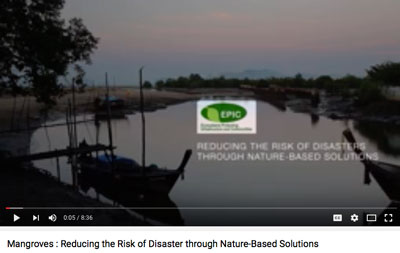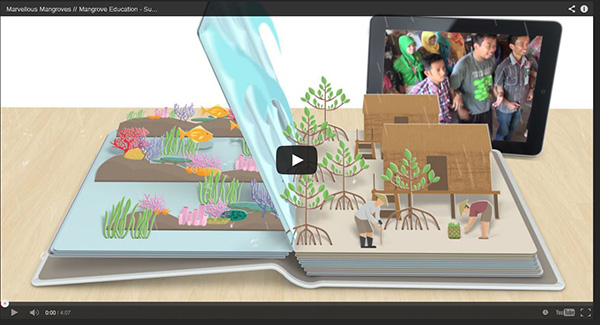Ecological Mangrove Rehabilitation in Indonesia demonstrates effectiveness 
In 1991, 20 hectares of pristine and biodiverse mangroves were cleared in Tiwoho Village, part of Bunaken National Marine Park, as part of a nation-wide program of aquaculture development known as the Blue Revolution, which has resulted in the loss of over 1,000,000 hectares of mangroves nation-wide. The aquaculture venture operated only for a period of 6 months, and the land lay fallow for the next decade. Six attempts to plant mangroves took place over the intervening years, but none of these attempts succeeded, as a result of failure to restore a functional hydrology to the system, which is the limiting factor for successful mangrove rehabilitation. In 2004, the principles of Ecological Mangrove Rehabilitation were applied to the site in a collaboration between villagers, local universities and NGOs, and international ecologists. The following pages bring to life this pivotal rehabilitation effort, the first of its kind in Indonesia where communities were enjoined to repair the hydrology of an abandoned shrimp pond complex to promote natural regeneration of mangroves. This pilot project has led to the successful rehabilitation of over 2000 hectares of mangroves in other parts of Indonesia, and serves as an example of collaboration and adaptive management that is changing the way Indonesian practitioners address mangrove restoration.
VIEW STORY ONLINE -or-
DOWNLOAD PDF HERE AFRICA
Kenyan community project restores mangroves while selling carbon credits

KENYA – Two villages living adjacent to the Indian Ocean in the southern coast of Kenya are improving their livelihoods after earning money from selling carbon credit from mangrove trees to international environmental organizations. Diana Wanyonyi reports from Mombasa. In the swampy, soft mud of the mangrove forest on Kenya’s south coast, farmer Idi BomaniI is with a local community group surveying and planting some of the seedlings that have fallen from the trees in the estuary. Idi is a member of the Mikoko Pamoja community project, a conservation and restoration program in which locals farm mangrove trees on the shores of the Indian Ocean. Mikoko Pamoja is the Swahili word for “mangrove.” The group was founded in 2009 after the residents of two nearby villages – Gazi and Makongeni – realized that the number of mangroves, which they depend on daily, were rapidly disappearing due to illegal harvesting for firewood, burning charcoal and building materials. READ MORE
Mangroves give services worth millions of dirhams
UAE – Millions of dollars’ worth environmental services provided by mangroves to the UAE people once again highlights the fact that their value goes beyond aesthetic beauty, a study presented on Tuesday said. A hectare mangrove offers ecosystem services valued at $193,845 (Dh71,1973) a year without including carbon sequestration services, according to the study. Mangroves offer a natural carbon sequestration process, by which carbon dioxide is removed from the atmosphere, mitigating the global warming. Coastal ecosystems such as mangroves that store and sequestrate carbon are called blue carbon ecosystems. Corals, seagrass beds, salt marshes, costal sand dunes and oyster beds are the other components of this ecosystem. The combined value of Abu Dhabi’s blue carbon ecosystems’ services was estimated to exceed Dh 2 billion a year. These services include carbon sequestration and storage, coastline protection, habitat provision and water purification. READ MORE
ASIA
Reclamation ruining mangroves and livelihood

MALAYSIA – Sahabat Alam Malaysia (SAM) has urged the Kedah Department of Environment to stop a reclamation project taking place in Kampung Tepi Laut near Kuala Kedah here. SAM president S.M. Mohamed Idris said the project had contravened environmental regulations and destroyed the area’s mangroves, adding that this would threaten the coastal fishermen’s source of income. “We are alarmed that the state government and local authority allowed the project to take place although the Environmental Impact Assessment (EIA) of the project has yet to be approved. “The EIA report is now being exhibited for public review from now until March 25,” he said in a statement recently. Mohamed Idris said a survey conducted found that a distance of about 1km out to sea had been reclaimed and nearly 10ha of mangroves along the coast had been affected. “This will threaten the marine life and affect the income of some 500 local fishermen’s families who make a living in the area. READ MORE
Mangroves in Manori-Gorai being destroyed

Thousands of mangrove trees along the Manori-Gorai belt have been destroyed through debris dumping, according to environment groups. In a letter to the mangrove cell, suburban collector and local ward officer, NGO Plants and Animals Welfare Society (PAWS-Mumbai) identified two locations with ongoing construction work within mangrove forests, a violation of environment laws and Bombay High Court (HC) rules. “Close to 2,000 mangrove trees have been hacked through land filling and dumping debris along Gorai – Borivali Road, near Essel World and Global Pagoda, which not only threatens marine life but disrupts the ecosystem, flora and fauna, and also harms the buffer zone against floods,” said Sunish Subramanian Kunju, secretary, PAWS-Mumbai. Through several images and satellite maps, the NGO identified that a gate had been setup to stop people from entering the site. A kilometre further down from the gate, excavator machines were spotted dumping debris and the area was cordoned off using tin sheets and green cloth. “Unidentified people have also set up watchtowers at the site to check the movement of citizens so that they cannot identify the violations,” said Kunju, adding, “It is clear a road is being constructed through the mangrove forests and a resort might be in the offing.” READ MORE
Deforestation in Sri Lanka slowed by 0.4% over ten years
SRI LANKA – According to the report issued by the Food and Agriculture Organization (FAO) of the United Nations, deforestation in Sri Lanka has decreased by 0.4 per cent during the past decade. Conservator General of Forests Anura Sathurusinghe said that the FAO report, issued every five years, has rated Sri Lanka as a country with less deforestation during the period of years 2000 – 2010. Meanwhile, he said they had decided to launch an web portal to detect the places where deforestation was prevalent around the country. “The website will be launched in the coming month. Any person who has information of deforestation taking place in their areas can inform us so that we can investigate it,” he said, adding this would help immeasurably to control deforestation in the country. – READ MORE
AMERICAS
Fisherwomen from Venezuela recognized for their achievement

VENEZUELA – For the first time in Venezuela, seven fisher-women from Paraguaná have been recognized by the Environmental Protection Association (AEPA Falcon), a non governmental environmental organization that is governed by the United Nations. The event, called ”Meeting of Fisher Women”, is aimed at enhancing the role of women in fishing, thus breaking with the norms that artisanal fishing in Venezuela. The award recognizes that their production and efforts are no longer solely relegated to men and shows that females are now being seen within this ancestral practice and play a crucial role in society. The meeting was attended by regional authorities, including the Legislative Council member Falcón (CLEF) Daicis López, Falcón Ombudsman Edisoi Sandoval, Los Taques councilor Ronny Falcón, the chronicler of Los Taques Jesus Muñoz Freites, representatives of the Regional Comptroller, Ministry of Fisheries, Unamujer and delegates of CONPPA Tío Pedro from the community of El Supí. READ MORE
Honduras wetlands grabbing continues in Ramsar Site 1000
HONDURAS – Land (and water) grabbing and loss of biodiversity is taking place in the wetlands of Ramsar Site #1000 and the Protected Areas (PAs) of the Gulf of Fonseca, Honduras, mainly due to shrimp aquaculture. The institutions responsible for conserving these ecosystems, such as the Instituto de Conservación Forestal (ICF), the Honduran Forestry Conservation Institute, and Mi Ambiente (MiA), the country’s Energy, Natural Resources, Environment and Mining Ministry, are unable or unwilling to enforce the environmental essence of their statements and those made by the president of Honduras. There are 4 business entrepreneurs in the Gulf in Fonseca who are taking over the wetlands along a large portion of the southern coast. READ MORE
Industry lobbyists threaten marine monument designations

USA – Elected representatives in Congress and industry groups are appealing to the administration of U.S. President Donald Trump to investigate the potential of removing marine monument designations made by Trump’s predecessors, Barack Obama and George W. Bush. U.S. House of Representatives Committee on Natural Resources Chairman Rob Bishop (R-UT) and Rep. Aumua Amata Coleman Radewagen (R-American Samoa) sent a letter to Trump earlier this week requesting the removal of fishing restrictions and the reinstatement of fisheries management under federal law, according to a letter released by the committee. “Using the Antiquities Act to close U.S. waters to domestic fisheries is a clear example of federal overreach and regulatory duplication and obstructs well-managed, sustainable U.S. fishing industries in favor of their foreign counterparts,” the letter said. In their letter, Bishop and Radewagen urge Trump to “act swiftly and effectively to remove all marine monument fishing prohibitions,” but do not clarify what specific actions they are asking Trump to take to undo the marine monument designations made under the powers of the Antiquities Act. READ MORE
Conservation groups push Mexican shrimp boycott to save vaquita

MEXICO – Citing the need for emergency action to save the dwindling population of the endangered vaquita, the world’s smallest porpoise, representatives of several conservation-focused organizations are calling for a boycott on shrimp sourced from Mexico. Fewer than 40 individual vaquita live in their natural habitat in Mexico’s northern Gulf of California, and biologists estimate the species will become extinct within three years if no action is taken, according to a press release from the Animal Welfare Institute, which is spearheading the boycott movement along with the Natural Resources Defense Council and the Center for Biological Diversity. “This is the vaquita’s very last chance,” Sarah Uhlemann, international program director with the Center for Biological Diversity, said in a press release. “For decades, Mexican officials have failed the vaquita, and now only the strongest of actions will get their attention. To save these wonderful little porpoises, we have to boycott Mexican shrimp.” READ MORE
OCEANA
Mangroves died of thirst

AUSTRALIA – A James Cook University scientist has discovered why there was an unprecedented dieback of mangroves in the Gulf of Carpentaria in early 2016 – the plants died of thirst. As explained in findings published today in the Journal of Marine and Freshwater Research, Dr Norman Duke, leader of JCU’s Mangrove Research hub, headed an investigation into the massive mangrove dieback, using aerial observations and satellite mapping data of the area dating back to 1972, combined with weather and climate records. Dr Duke said they found three factors came together to produce the unprecedented dieback of 7400 hectares of mangroves, which stretched for 1000 kilometres along the Gulf coast. “From 2011 the coastline had experienced below-average rainfalls, and the 2015/16 drought was particularly severe. Secondly the temperatures in the area were at record levels and thirdly, some mangroves were left high and dry as the sea level dropped about 20cm during a particularly strong El Nino.” READ MORE
Hello everyone at MAP!
I hope that this email finds you all well and everyone is having an excellent week!
My name is Emma McDowell and I am the new Volunteer Intern at MAP. I am from the United States (Vermont), I am currently completing a US Fulbright Grant in Nakhon Si Tammarat, Thailand. As part of my grant I am encouraged to take time to pursue an internship in a field that is of interest to me, and I am so excited to be working at MAP for the next month.
I double majored in Environmental Studies and Spanish & Hispanic Studies in university, and am looking to apply for masters programs in Anthropology with an emphasis on Environmental Conservation and Management in the coming year. The past two years I have worked in Costa Rica, Guatemala and Thailand on different environmental and wildlife conservation projects and am excited to learn more at MAP.
I am very interested in learning as much as I can about community based conservation projects, mangrove forests, and gaining experience working in the field and the office. I would love to help out in any way that I can, so please to not hesitate to let me know if there is anything I can do to make your jobs easier.
I look forward to working with you all and getting to know everyone!
Sending my best,
Emma McDowell
MAP-Asia Office Development & Field Project Assistant (Volunteer Intern)


















